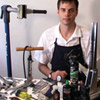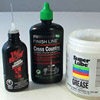How to Tune Up Your Bike
No matter how often you ride you should give your bike a tune-up at least once a year.
Today we’ll learn how to tune up your bike, which I’d recommend doing at least once a year, or even every few months if you ride every day. Since I can’t demonstrate every step of the procedure while keeping this video short, I’ll give a general overview and cover each step further in separate tutorials. You’ll notice below that I’ve written out all of the steps and included links to related tutorials. I’ll be adding new links as future videos are uploaded.
Depending how much work is needed you’ll need a several tools for this job. Most importantly you’ll need:
- Dish soap, water and some rags.
- Chain oil and a light lubricant like Tri-Flow.
- An air pump and tire pressure gauge.
- A set of metric allen wrenches (4-8mm).
- A set of metric open-end wrenches (8-17mm).
- Two 13mm and two 15mm cone wrenches.
- A set of appropriate sized headset wrenches.
- A spoke wrench for wheel truing.
- A chain wear indicator – Alternate Method.
- A repair stand or some rope to hang your bike from the ceiling.
Wheel Cleaning and Tuning
First disconnect your brakes and remove both wheels. This makes it easier to clean the bike frame and tune-up the wheels. Clean between the sprockets of your freewheel or cassette using a rag or a proper cleaning tool. Using a dry rag, wipe down the hubs, spokes, and rims on both wheels. If they are difficult to clean dip your rag in some mildly soapy water and try again. Never use harsh cleaners or a water hose to clean your bike. Check both hub adjustments to make sure they aren’t loose and that they spin freely. Adjust or overhaul them as necessary.
If you have a truing stand, deflate the tires and check the alignment and spoke tension of both wheels and adjust them as needed. Inflate both tires to the recommended pressure and set them aside.
Frame Cleaning
Now wipe down your entire bike frame and components. I usually start at the handlebar and work my way to the rear derailleur in order to keep my rag clean as long as possible. Again you can dampen your rag with soapy water if needed to loosen up any tough grime.
Frame and Parts Inspection
Once clean it’s a good idea to carefully inspect the entire surface of your frame for any hairline cracks or damage. If you notice anything you should take it to your local shop right away for further assessment, as it can be dangerous to ride on a cracked frame. Inspect all of your components as well, paying particular attention to the brake and shift cables. If they are frayed or have damaged housings, now is the time to replace them.
Lubrication
Now apply a few drops of some light lubricant to the inside of your cable housings and all of the pivot points on your brake and shift components. Avoid getting any oil on your brake pads, and wipe off any excess so that it doesn’t collect dirt. Here’s a video that demonstrates cable lubrication.
Headset and Bottom Bracket
Check the adjustment of both your headset and bottom bracket to make sure they aren’t loose and spin smoothly.
Brakes
Inspect all of your brake pad surfaces and carefully trim away any wear ridges with a razor blade. Resurface them with rough sandpaper to clean up road grime. You should replace the pads if they are worn past the indicator line, or if you can see metal poking through the surface. Watch the brake tutorials.
Tightening
Now check all of the bolts on your bike to make sure they’re tight, but be careful not to over-tighten. If they already feel tight enough don’t force them any tighter. Important areas to check include your handlebars, levers, shifters, stem, seat, seatpost, brakes, derailleurs, cranks and pedals.
Here is a bicycle torque specification guide from Park Tools.
Final Adjustments
Now reinstall the wheels and reconnect your brakes. Adjust the brake pads and cable tension as needed. Clean the chain, check for chain wear, and then lubricate it with chain oil. Then adjust the rear derailleur first, and the front derailleur second. Now place the bike on the ground and adjust your handlebar and seat position if needed.
Test Ride
The last step is very important. Take your bike on a thorough test ride, running through all of the gears and testing the brakes. Most of the time you’ll have a few minor re-adjustments to make before your bike is fully ready to ride.
Related Links
Recommended Tools
- Park Tool SK-3 Starter Mechanic Tool Kit
- Park Tool PK-3 Professional Tool Kit
- Park Tool PCS-9 Repair Stand
- Park Tool PCS-4 Repair Stand
- Park Tool TS-8 Home Truing Stand
- Park Tool TS-2.2 Home Truing Stand
Categories
Discuss this topic in the Bicycle Repairs and Mechanics Forum
Specialized expedition in need of repair
Latest post 3 hours agoHello I have recently pulled my 2005 specialized expedition out of the garage. It's in need of some repair due to it being damaged by super storm sandy. My shed was flooded with ocean water. The frame itself looks perfect but the moving parts have some rust. Including the fork, brakes, and gears. I'm just looking for replacement parts I have no intentions on buying a new bike. Please help than...
Read moreRear hub issue
Latest post 3 days agoI have a 10-year-old 105 rear hub, and one of the pawls is acting up, I cleaned it and relubed the hub pawls but it still won't engage as fast as it did, like one of the pawls isn't working. I think it might be time to get a new hub. I would like one that engages faster but don't want to spend the money for something like the DT Swiss hub, what recommendations do any of you have for a hub? Or i...
Read moreTyres keep popping off wheels...
Latest post 1 week agoHello guys Just bought a new pair of 700c hybrid wheelset with an inside rim width of 19mm. I have tried to fit schwalbe 700 x 40c tyres on them but the tyres just pop out from the rim when inflated. It seems to be a loose fit. Somebody please advise. Thanks...
Read moreWhat tools have you bought recently?
Latest post 1 week agoI'm slowly eliminated all LBSes in my area as options for servicing, LOL. The latest one has been struck off my list after watching, pained, their approach to removing the axle end caps from a hub with cartridge bearings. Suffice to say, I finally ordered a blind bearing puller kit and a bearing press kit. If you want something done properly, you have to do it yourself! Have you bought any nic...
Read moreModern rims crack at spoke holes
Latest post 1 week agoRecently, I was in one of the local bike shops. Someone had brought a bike back to have the back wheel re-trued. There were actually cracks in the rim, originating from the spoke holes. I have had the same problem with my bike. In past decades you could buy a bike, and the wheels were strong. With modern rims, the aluminum is getting thinner and thinner. Now the rims crack. With heavy riders, a...
Read moreAre all folding tyres made of Kevlar bead?
Latest post 2 weeks agoHello guys I understand cheaper regular tyres are made with a steel wire bead. But are all folding tyres made of Kevlar bead? I have just purchased a set of tyres as per attached photo and wanted to know if the bead is Kevlar. Can anybody please help? Thanks...
Read moreTire bead won’t seat into rim
Latest post 2 weeks agoI bought a Tamobyke V20. Both the front and rear tire beads slide off the rim when inflating much at all. How do I get them to sit in there where they belong? Pics attached ty!!! IMG_3164.jpeg (Size: 61.62 KB / Downloads: 42) IMG_3173.jpeg (Size: 46.46 KB / Downloads: 41) ...
Read moreHeadset overtightening
Latest post 2 weeks agoI have a Fondriest and could not get the headset to tighten without over tightening and then it will not steer properly because of heavy drag on the bars. I replaced the headset with no change so I replaced the steel fork with s Hylix carbon fiber bar and another new heatset and pinch steering head lock. Still it wont adjust properly. it acts as if the bottom headset bearing is too deep in the cup...
Read moreThread busted on right pedal crank
Latest post 3 weeks agoHi Ive joined to specifically ask about a problem which may have been covered before Im sure. My right pedal broke so I had to replace it. Then had issues getting the new pedal to go on straight so I was riding with it slightly at a bend. But then it just came loose and fell off. Problem is now the thread seems busted and the pedal just slots in with no screwing needed because the hole is enlar...
Read moreCup & Cone — Simple & Durable or PITA & Outmoded?
Latest post 3 weeks agoCup and cone hubs have long been considered simple, durable, easily maintained, and reliable. Having messed around with a couple of older hubs tonight, I ended up looking at my sealed-bearing hubs with increased fondness. I'm wondering what other people think. Should we old farts just accept that modern hubs with cartridge bearings are the way forward?...
Read moreTrek domane tyre
Latest post 1 month agoHi I have a trek domane 2.3, and I have changed the rear tyre to 28 (it was 25 originally) The tyre rubs with the brake arm (v brake), I fear it doesn’t seem to be compatible Is there any way to adjust the position of the brake arm? I just need it to ne around 2mm higher Thanks...
Read moreFalling back
Latest post 1 month agoIn December of 2009 I had a first generation carbon fiber fork break on my road bike and it dropped me right on my forehead. This gave me a very serious concussion and both ER doctors and most neurologists do not take them serious. So it took about two years of my slowly dying since I couldn't even remember to eat before my Cop friend took me to a proper neurologist who diagnosed it as a concussio...
Read moreDerailluer Hanger Alignment Tool
Latest post 1 month agoI cannot express enough about the importance of this tool when having to deal with multi speed bicycles. I have been in the bicycle biz in one fashion or the other for over 30 years. Have sold many new bicycles and 90% have been out of wack fresh from the box. With used bikes crossing your path you should just expect it to be bad. And never string new cables without checking the hanger first, ever...
Read moreChain sits on top of chainring when shifting up
Latest post 1 month agoHey guys, First post here. I've tried searching, but I don't know what you call this. I have a vintage Schwinn Passage that I picked up a few months ago. At first it worked well, but recently it's been giving me trouble. When I shift, the chain pops into the higher (larger) gear, but then sits on top of the chain ring. What ends up happening is that the chainring will keep turning, and eve...
Read moreWTB Raddler TCS 40c, small cut - repairable?
Latest post 1 month agoWent to fix the slow leak on my gravel bike's rear tyre. Found the culprit: a small cut near the middle of the tyre. The good news is it gave me an excuse to order a pair of Panaracer 43c semi-slick GravelKings (most of my local rides are more road-focused) to try out. Meanwhile, I was considering ye olde vulcanised patch repair to the inside of the tyre and superglue to the outside, but I'm thi...
Read more


